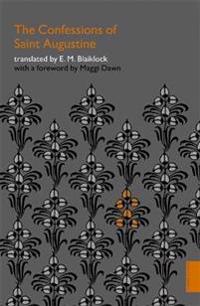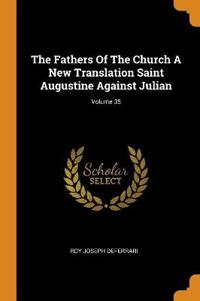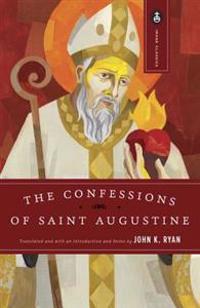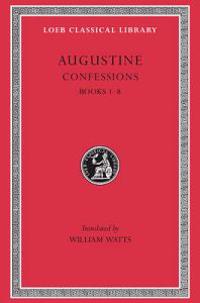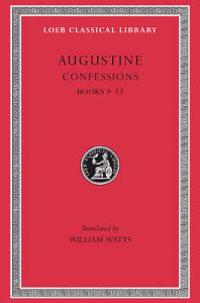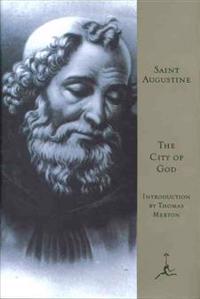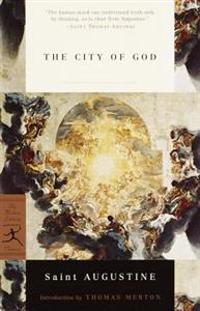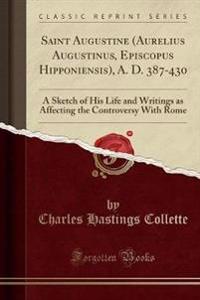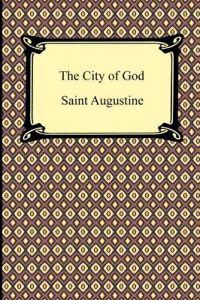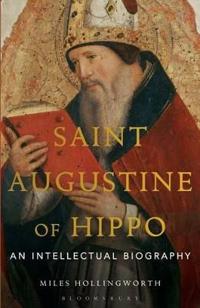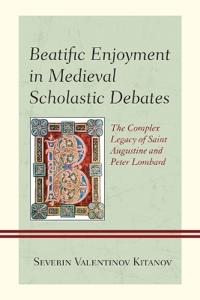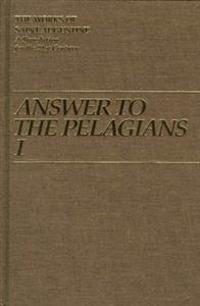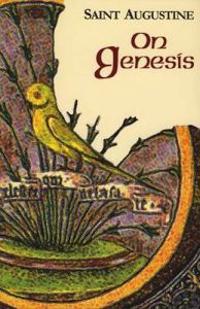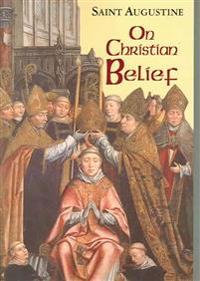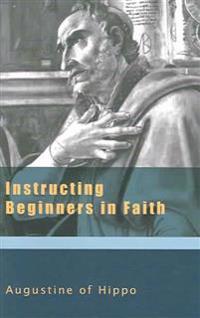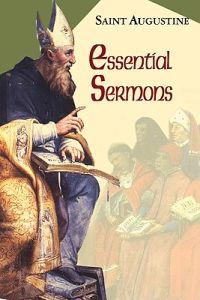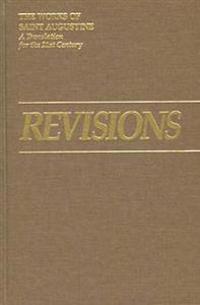Political and Social Ideas of Saint Augustine, The (Pocket)
avH.A. Deane
ISBN: 9780231085694 - UTGIVEN: 1966-02-01The Confessions of Saint Augustine (Pocket)
avE. M. (TRN) Blaiklock, Maggi (FRW) Dawn, E. M. (TRN) Blaiklock
ISBN: 9780340980125 - UTGIVEN: 2010-04You made us for yourself, and our heart is restless until it finds rest in you. St Augustine was a towering figure in his own time, and remains the greatest of the fathers of the church. His CONFESSIONS are an autobiographical work, recalling crucial events in his life: his mid-4th-century boyhood i[...]
The Fathers of the Church a New Translation Saint Augustine Against Julian; Volume 35 (häftad)
ISBN: 9780343204877 - UTGIVEN: 2018-10Confessions (Häftad)
avSaint Augustine
ISBN: 9780385029551 - UTGIVEN: 196004The greatest spiritual autobiography of all time, this classic work is a literary and theological masterpiece. John K. Ryan's masterful translation brings out the luster of Augustine's unmatched tale of his soul's journey to God.[...]
The Confessions of Saint Augustine
ISBN: 9780451531216 - UTGIVEN: 2009-03In his 1500-year-old "Confessions," Augustine of Hippo tells the story of his remarkable life, interwoven with his insights of endless wisdom. Noted Paul VI: ?all of antiquity's philosophy converges in his work.?
[...]Confessions (Inbunden)
avSaint Augustine
ISBN: 9780674990296 - UTGIVEN: 199801Augustine's Confessions is one of the most influential and most innovative works of Latin literature. Written in the author's early forties in the last years of the fourth century A.D. and during his first years as a bishop, they reflect on his life and on the activity of remembering and interpretin[...]
Confessions (Inbunden)
avSaint Augustine
ISBN: 9780674990302 - UTGIVEN: 199801Augustine's Confessions is one of the most influential and most innovative works of Latin literature. Written in the author's early forties in the last years of the fourth century A.D. and during his first years as a bishop, they reflect on his life and on the activity of remembering and interpretin[...]
City of God (Inbunden)
avSaint Augustine
ISBN: 9780679600879 - UTGIVEN: 199404One of the great cornerstones in the history of Christian philosophy, The City of God provides an insightful interpretation of the development of modern Western society and the origin of most Western thought. Contrasting earthly and heavenly cities--representing the omnipresent struggle between good[...]
City of God (Häftad)
avSaint Augustine
ISBN: 9780679783190 - UTGIVEN: 2000-10One of the great cornerstones in the history of Christian philosophy, The City of God provides an insightful interpretation of the development of modern Western society and the origin of most Western thought. Contrasting earthly and heavenly cities--representing the omnipresent struggle between good[...]
Saint Augustine (Inbunden)
avJ. Kausten
ISBN: 9780809100453 - UTGIVEN: 1978-06A monumental project which brings the English-speaking work key selections from the remarkable literature of early Christianity -- vertiable trasures of Christian faith and theology in superb translations.[...]
Confessions (Inbunden)
avSaint Augustine, F. J. (TRN) Sheed, Peter Robert Lamont (INT) Brown
ISBN: 9780872208179 - UTGIVEN: 2007-02The second Hackett edition of the Sheed translation, a classic in its own right, offers a wealth of notes on philosophical, theological, historical, and liturgical issues raised by the "Confessions", as well as paragraph numbers of the Latin critical edition, and a thorough index.[...]
Saint Augustine (Aurelius Augustinus, Episcopus Hipponiensis), A. D. 387-430 (häftad)
ISBN: 9781331513902 - UTGIVEN: 2015-09Saint Augustine of Hippo
ISBN: 9781441173720 - UTGIVEN: 2013-07Augustine was one of the West's first public philosophers. Intellectually brilliant and a gifted writer, he is known primarily as one of the great figures of Christian late antiquity. In this new biography we encounter him through the complexities of his remarkable personality. Miles Hollingworth de[...]
Beatific Enjoyment in Medieval Scholastic Debates: The Complex Legacy of Saint Augustine and Peter Lombard (häftad)
ISBN: 9781498556484 - UTGIVEN: 2009-12Beatific Enjoyment in Medieval Scholastic Debates examines the religious concept of enjoyment as discussed by scholastic theologians in the Latin Middle Ages. Severin Kitanov argues that central to the concept of beatific enjoyment (fruitio beatifica) is[...]
Answer to the Pelagians (Inbunden)
avSaint Augustine, John E. (EDT) Rotelle, Roland J. (TRN) Teske
ISBN: 9781565480926 - UTGIVEN: 1997-08First of volume of Augustine's Answer to the Pelagians
On Genesis (Häftad)
avSaint Augustine
ISBN: 9781565482012 - UTGIVEN: 2005-05No other part of the Hebrew Scriptures, aside from the Psalter and sections of the prophet Isaiah, captured the interest and aroused the attention of the early Church as did the opening chapters of the Book of Genesis. Augustine of Hippo, the early Latin Church's profoundest scholar, devoted three t[...]
On Christian Belief (Pocket)
avSaint Augustine
ISBN: 9781565482340 - UTGIVEN: 2005-12The seven works of Augustine that are contained in this volume all deal with the problem of faith in God. They were written over the course of three decades, beginning with True Religion (390) and extending to the Enchiridion on Faith, Hope, and Charity (c. 421). Hence this selection of writings pro[...]
Instructing Beginners in Faith (Pocket)
avSaint Augustine, Raymond F. Canning, Boniface Ramsey
ISBN: 9781565482395 - UTGIVEN: 2006-03Although not usually considered to be on the same level as The Confessions or The City of God, to name just two of Augustine's greatest works, the short treatise entitled Instructing Beginners in Faith has in fact had a powerful influence on the Christian Church. It began as a reflection on the most[...]
Essential Sermons (Häftad)
avSaint Augustine
ISBN: 9781565482760 - UTGIVEN: 2007-12From Augustine's finest preaching, Daniel Doyle has selected sermons that represent a wide range of subjects, including God, Christ, sin, grace, conversion, martyrdom, sacraments, marriage, wealth, poverty, Christmas, Easter, and living the Christian life. Students and preachers alike will discover [...]
Revisions (Retractationes) (Inbunden)
avSaint Augustine
ISBN: 9781565483606 - UTGIVEN: 2011-01Revisions, like many of Augustine's works, has a singular purpose. Composed in his old age, he reviews nearly all his writings, summarizing and correcting and even expressing regret. The Revisions is important not only for establishing the chronology of Augustine's works but also for providing insig[...]


